Forum
Pyeongchang Peace Forum 2022
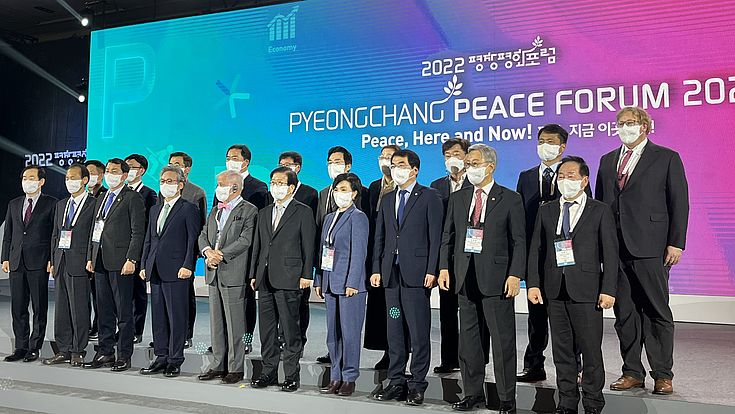
The PyeongChang Peace forum 2022 was hosted under the slogan “Peace, Here and Now!” with the main theme “The Declaration to End the Korean War and Beyond”. It discussed peace-related issues on the Korean Peninsula under 5 key agendas: Economy, Sports, DMZ Peace zone, UN SDGs, and Peace Public Diplomacy for the special agenda “peace cooperation between South Korea and North Korea through co-hosting of the Winter Youth Olympic Games Gangwon 2024”.
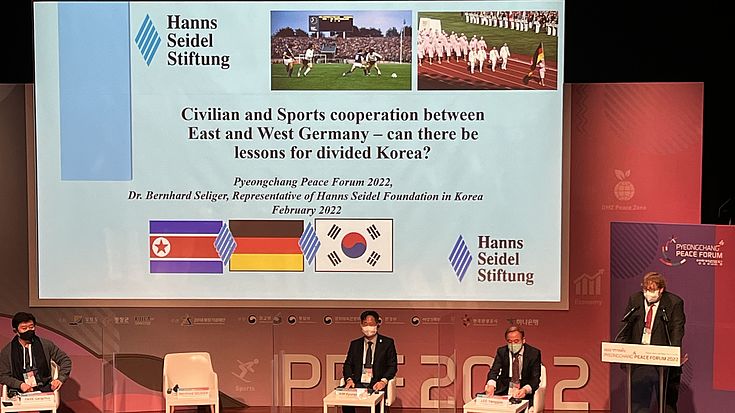
Hanns Seidel Foundation (HSF) Korea took part in the Special Agenda Session 1 on 22 February and the Partner Session 8 on 23 February. At the Special Agenda Session, Dr. Bernhard Seliger, representative of HSF Korea spoke about the significance of sports as an avenue for dealing with North Korea. He mentioned how sports is used as a political tool and said that the fundamental problem with sports competition and South Korea is that it is highly political and high profile. He recommended people-to-people contacts and sports and to reduce publicized meetings. In conclusion, Dr. Seliger mentioned a need for a radically new approach, especially regarding the National Security Law to create a realm of civil exchanges and a need to accept the loss of state control in sports exchange. You can watch the session here.
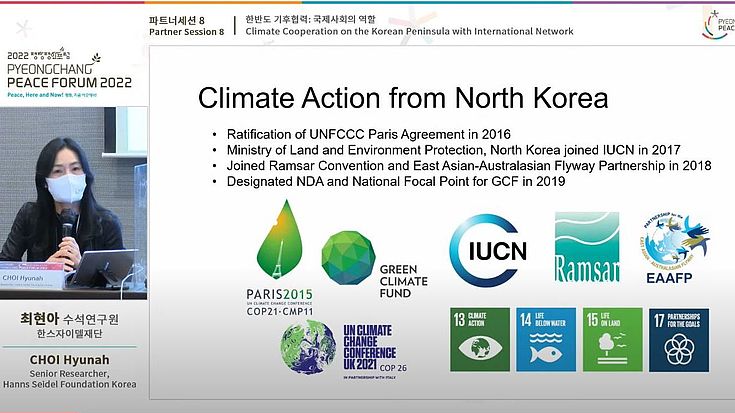
On 23 February, HSF Korea hosted a partner session with the title “Climate Cooperation on the Korean Peninsula through an International Network”. Dr. Hyun-Ah Choi, Senior researcher at HSF Korea, shared North Korea’s efforts against climate change and explained how climate actions are ongoing in North Korea similar to other countries. She gave some examples such as ratifying the Paris Agreement, becoming a member of IUCN in 2017, and participating in the Ramsar Convention. Moreover, she concluded that research and activities regarding the climate response are continuing, but natural disasters are ongoing in North Korea.
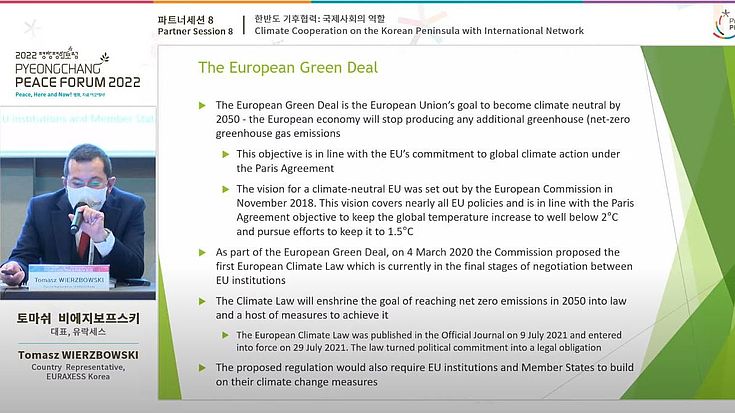
Dr. Tomasz Wierzbowski, Representative of EURAXESS Korea, talked about the current priorities of European policies, and the twin transitions, namely digital transition, and the EU Green Deal, which aims to achieve zero net greenhouse gas emission by 2050. Since South Korea’s New deal is very similar to the EU Green deal, he suggested South Korea and the EU work together to reduce climate change. He also mentioned that North Korea has the political infrastructure to be utilized by the international community and South Korea. In conclusion, he emphasized the need to seek cooperation and discussion with North Korea under the multilateral arrangement.
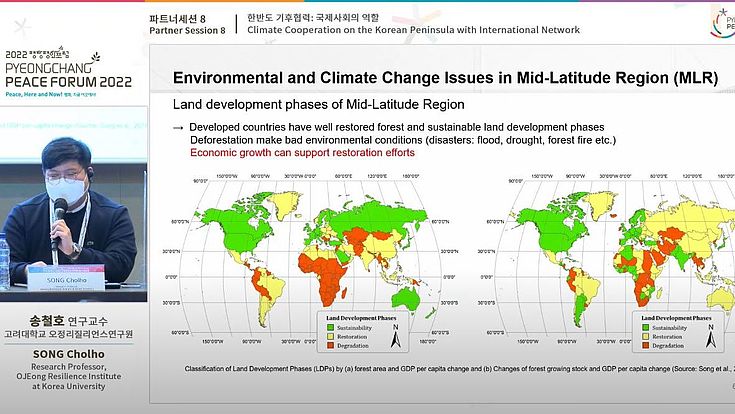
Prof. Cholho Song, a research professor from OJEong Resilience Institute at Korea University, shared some pictures and graphs about environmental and climate change issues in the mid-latitude region and explained how climate change is bringing about numerous natural disasters. Further he specified climate-related problems in North Korea, such as land degradation, and added that North Korea is dependent on international cooperation for environmental restoration and developing adaptive measures for climate change. He also focused on climate technology and how it can be used to help with ecological restoration in North Korea.
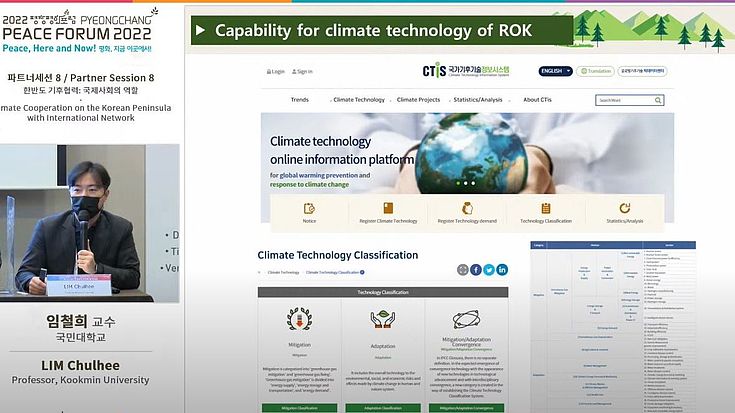
Prof. Chulhee Lim from Kookmin University, explained how we can find out about North Korea's need for technical support thorugh its NDCs, most of which South Korea can provide. He also mentioned South Korea’s “climate change response technology development act” which shows the country’s commitment to the issue of climate change. He emphasized that for inter-Korean connection, multilateral cooperation is very important. Similarly, for dealing with the climate agenda, international cooperation, as well as international and multilateral arrangements are critical. He finished his presentation by sharing two possible cases for bilateral cooperation between the South Korean government and the North Korean regime.
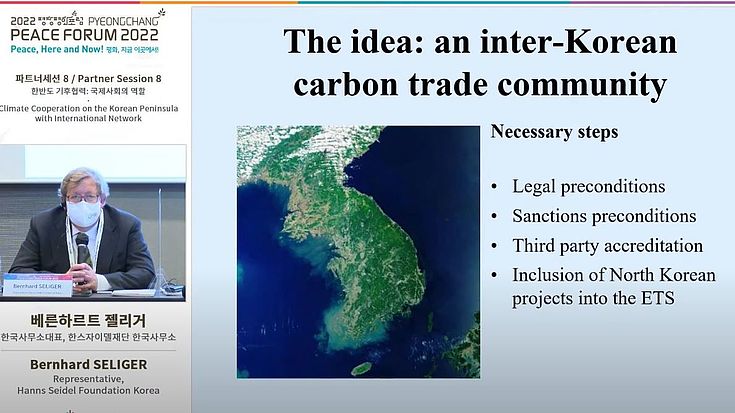
Dr. Bernhard Seliger introduced a possible method for inter-Korean cooperation in the form of joint carbon trading. He mentioned the Clean Development Mechanism project in the 2000s, a global, environmental investment and credit scheme initiated and certified by the UNFCCC. Under this project, carbon credits were issued and traded on the European market. He added that when North Korea ended the project in 2012, the carbon price in Europe was low, but the South Korean carbon market offered a very attractive price Therefore, Dr. Seliger recommended the Inter-Korean Carbon Trading Community, in which South Korea can buy carbon credits from North Korea. You can watch the full session here.
